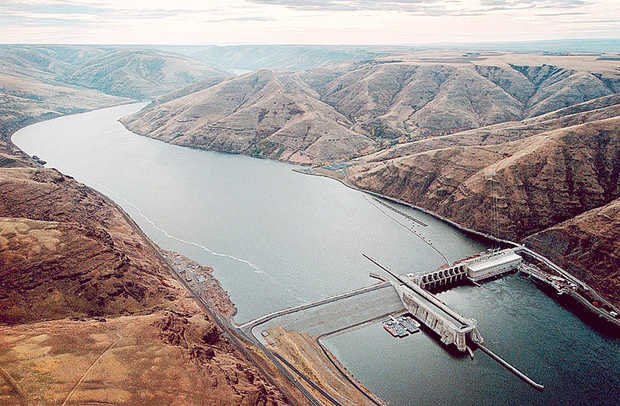forum
library
tutorial
contact

Bitcoins and Hydropower:
What's the Big Deal?
by Elizabeth Ingram
HydroWorld, January 17, 2018
|
the film forum library tutorial contact |

|
Bitcoins and Hydropower:
by Elizabeth Ingram
|
CNBC recently reported about the number of bitcoin and cryptocurrency miners locating in Wenatchee, Washington.
Why Wenatchee? Power is 2 to 3 cents per kWh thanks to the hydropower capacity of the Columbia River.
 There is so much buzz these days about bitcoin mining, particularly with regard to the high amount of energy required and how hydropower can help.
There is so much buzz these days about bitcoin mining, particularly with regard to the high amount of energy required and how hydropower can help.
First, what are bitcoins and why should I care about them? According to Investopedia: "Bitcoin mining is the process by which transactions are verified and added to the public ledger, known as the block chain, and also the means through which new bitcoin are released. Anyone with access to the internet and suitable hardware can participate in mining. The mining process involves compiling recent transactions into blocks and trying to solve a computationally difficult puzzle. The participant who first solves the puzzle gets to place the next block on the block chain and claim the rewards. The rewards, which incentivize mining, are both the transaction fees associated with the transactions compiled in the block as well as newly released bitcoin."
In the end, if I understand this correctly, the hope is that bitcoin (and other forms of cryptocurrency) will gradually decrease production of currency, capping the total amount of currency to ever be in circulation, thus mimicking precious metals.
The main inputs to bitcoin mining are the hardware, electricity and time. The challenge is that the cost of the energy consumed by the hardware can be greater than the revenue generated. This is because reports indicate bitcoin requires about 215 kWh of energy for each transaction. Investopedia says the total electricity usage for bitcoin mining is about 28 TWh per year, "more than the national power usage of the country of Nigeria." But the rewards can indeed be great. At the time I wrote this, one bitcoin equaled US$10,087.89 and according to Forbes, each transaction is worth an average of six bitcoin.
Bitcoin miners must use the latest hardware designed specifically for mining bitcoin, known as application-specific integrated circuit (ASIC), and must find ways to minimize the cost of the energy consumed. And here's where hydropower comes in. Costs to mine a bitcoin vary greatly depending on where the mining equipment is located. And this depends almost entirely on the cost of electricity.
CNBC recently reported about the number of bitcoin and cryptocurrency miners locating in Wenatchee, Wash., U.S., calling it "the epicenter of bitcoin mining in the United States." Why Wenatchee? Power is 2 to 3 cents per kWh thanks to the hydropower capacity of the Columbia River.
Additionally, multiple news agencies reported last week that Canadian utility Hydro-Quebec plans to get in on the action. Bloomberg reported that the utility "expects to announce agreements in 2018" and envisions cryptocurrency miners using about 5 TWh of power annually from the hydroelectric facilities in the region.
A company, called HydroMiner, has been established that uses "green energy drawn from hydro power stations in the Alpine region of Europe" to power its crypto currency mining efforts. HydroMiner says that thanks to hydropower, its cost of electricity is 85% lower than the average in Europe. The two hydro projects the company is using are in Schonberg in Lower Austria and Murau in Styria.
learn more on topics covered in the film
see the video
read the script
learn the songs
discussion forum
